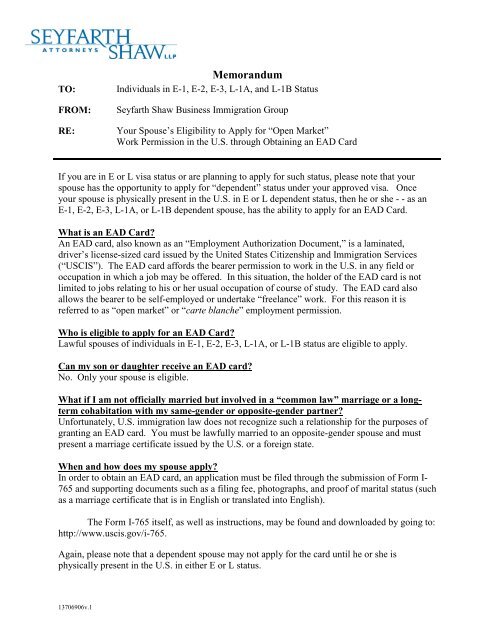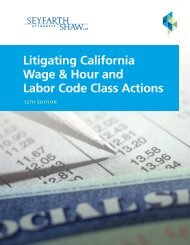U.S. Work Permission for Spouses of L-1 and E Workers
U.S. Work Permission for Spouses of L-1 and E Workers
U.S. Work Permission for Spouses of L-1 and E Workers
Create successful ePaper yourself
Turn your PDF publications into a flip-book with our unique Google optimized e-Paper software.
TO:<br />
FROM:<br />
RE:<br />
Memor<strong>and</strong>um<br />
Individuals in E-1, E-2, E-3, L-1A, <strong>and</strong> L-1B Status<br />
Seyfarth Shaw Business Immigration Group<br />
Your Spouse’s Eligibility to Apply <strong>for</strong> “Open Market”<br />
<strong>Work</strong> <strong>Permission</strong> in the U.S. through Obtaining an EAD Card<br />
If you are in E or L visa status or are planning to apply <strong>for</strong> such status, please note that your<br />
spouse has the opportunity to apply <strong>for</strong> “dependent” status under your approved visa. Once<br />
your spouse is physically present in the U.S. in E or L dependent status, then he or she - - as an<br />
E-1, E-2, E-3, L-1A, or L-1B dependent spouse, has the ability to apply <strong>for</strong> an EAD Card.<br />
What is an EAD Card?<br />
An EAD card, also known as an “Employment Authorization Document,” is a laminated,<br />
driver’s license-sized card issued by the United States Citizenship <strong>and</strong> Immigration Services<br />
(“USCIS”). The EAD card af<strong>for</strong>ds the bearer permission to work in the U.S. in any field or<br />
occupation in which a job may be <strong>of</strong>fered. In this situation, the holder <strong>of</strong> the EAD card is not<br />
limited to jobs relating to his or her usual occupation <strong>of</strong> course <strong>of</strong> study. The EAD card also<br />
allows the bearer to be self-employed or undertake “freelance” work. For this reason it is<br />
referred to as “open market” or “carte blanche” employment permission.<br />
Who is eligible to apply <strong>for</strong> an EAD Card?<br />
Lawful spouses <strong>of</strong> individuals in E-1, E-2, E-3, L-1A, or L-1B status are eligible to apply.<br />
Can my son or daughter receive an EAD card?<br />
No. Only your spouse is eligible.<br />
What if I am not <strong>of</strong>ficially married but involved in a “common law” marriage or a longterm<br />
cohabitation with my same-gender or opposite-gender partner?<br />
Un<strong>for</strong>tunately, U.S. immigration law does not recognize such a relationship <strong>for</strong> the purposes <strong>of</strong><br />
granting an EAD card. You must be lawfully married to an opposite-gender spouse <strong>and</strong> must<br />
present a marriage certificate issued by the U.S. or a <strong>for</strong>eign state.<br />
When <strong>and</strong> how does my spouse apply?<br />
In order to obtain an EAD card, an application must be filed through the submission <strong>of</strong> Form I-<br />
765 <strong>and</strong> supporting documents such as a filing fee, photographs, <strong>and</strong> pro<strong>of</strong> <strong>of</strong> marital status (such<br />
as a marriage certificate that is in English or translated into English).<br />
The Form I-765 itself, as well as instructions, may be found <strong>and</strong> downloaded by going to:<br />
http://www.uscis.gov/i-765.<br />
Again, please note that a dependent spouse may not apply <strong>for</strong> the card until he or she is<br />
physically present in the U.S. in either E or L status.<br />
13706906v.1
Page 2<br />
Is an attorney required in order to file the Form I-765?<br />
No. Many spouses file the Form I-765 by closely following the instructions. However, some<br />
organizations will arrange <strong>for</strong> their outside immigration counsel to assist in the preparation <strong>and</strong><br />
filing <strong>of</strong> the Form I-765. If you have questions or are uncertain <strong>of</strong> your company’s policy, you<br />
should check with your Human Resources representative.<br />
What other “best practices” should I follow?<br />
If your spouse is filing a Form I-765 on his or her own (without the assistance <strong>of</strong> an attorney), he<br />
or she should be certain to make photocopies <strong>of</strong> all documents, including the filing fee check,<br />
<strong>and</strong> be certain to file the documents through some “trackable” mailing system such as FedEx,<br />
UPS, or U.S. Postal Service Express Mail.<br />
For how long is the EAD valid?<br />
You are the individual who holds the work visa <strong>and</strong> who is considered to be the “primary visa<br />
holder.” Since your spouse is considered a dependent, his or her EAD card is usually granted <strong>for</strong><br />
the same period <strong>of</strong> validity as the date that is noted on your Form I-94 (Arrival/Departure<br />
document).<br />
Is my spouse required to apply <strong>for</strong> an EAD Card?<br />
A dependent spouse <strong>of</strong> an E or L visa holder is not required to apply <strong>for</strong> an EAD. However, if<br />
your spouse wishes to work or plans to seek employment, we recommend filing the application.<br />
What is the processing time?<br />
The normal processing time <strong>for</strong> a properly completed Form I-765 is 10 to 14 weeks.<br />
What if my spouse doesn’t receive a response within 90 days?<br />
Under a special U.S. government regulation, if a properly filed Form I-765 is not processed<br />
within 90 calendar days, the applicant may make an “InfoPass” appointment <strong>and</strong> appear at the<br />
USCIS <strong>of</strong>fice nearest to his or her residence to request a status report on the processing <strong>of</strong> the<br />
EAD card. More in<strong>for</strong>mation on InfoPass is found here:. http://infopass.uscis.gov/<br />
During the InfoPass appointment your spouse will explain the fact that there is a processing<br />
delay <strong>and</strong> the USCIS <strong>of</strong>ficer will contact the EAD card processing center to expedite the<br />
processing <strong>of</strong> the card.<br />
What happens if there is in<strong>for</strong>mation missing, or if the <strong>for</strong>m was not properly filed?<br />
Will the <strong>for</strong>m be rejected?<br />
In most instances the <strong>for</strong>m is not automatically rejected. Rather, the USCIS will issue a<br />
“Request <strong>for</strong> Further Evidence” (“RFE”) <strong>and</strong> will detail what is missing. There will be a specific<br />
deadline be<strong>for</strong>e which your spouse must respond. If the response is not received prior to the<br />
deadline, or if the response is deemed unsatisfactory, the application will be denied. However, a<br />
denied application does not prevent your spouse from filing another application in future.
Page 3<br />
Are there any other implications <strong>of</strong> an RFE?<br />
Yes. If the USCIS issues an RFE, it will “stop the clock” on the accrual <strong>of</strong> the 90 days. That<br />
processing “clock” will not start ticking again until the USCIS has received the response to the<br />
RFE. This is significant, since the issuance <strong>of</strong> an RFE <strong>and</strong> a delayed response to an RFE can<br />
create a delay in the accrual <strong>of</strong> the 90 days that are required be<strong>for</strong>e an InfoPass appointment may<br />
be granted.<br />
My spouse already has an EAD card <strong>and</strong> needs to apply <strong>for</strong> an extension.<br />
When should my spouse file the extension?<br />
Your spouse should file the application <strong>for</strong> extension 120 days- - or 4 months- - prior to the<br />
expiration date on the EAD card. This is extremely important <strong>for</strong> two reasons:<br />
(1) Once the EAD card has expired, your spouse will no longer have permission to work.<br />
This means that his or her current employer will have to either terminate your spouse’s<br />
employment or, at the very least, take him or her “<strong>of</strong>f payroll” <strong>and</strong> temporarily cease any<br />
payments until the new EAD card is issued. For both economic <strong>and</strong> career development<br />
reasons, this could prove disruptive <strong>for</strong> your spouse <strong>and</strong> your family.<br />
(2) If your spouse files <strong>for</strong> an extension at the 120-day mark <strong>and</strong> the case is returned under<br />
an RFE, your spouse may still have the ability to respond quickly <strong>and</strong> still accrue 90 days<br />
<strong>of</strong> processing time in order to be eligible <strong>for</strong> an InfoPass appointment - - thus obtaining<br />
an approval <strong>of</strong> the new EAD card prior to the expiration <strong>of</strong> the current EAD card.<br />
Can my spouse apply <strong>for</strong> an extension earlier than the 4-month window?<br />
No. Please note that any applications that are received prior to 120 days be<strong>for</strong>e the expiration<br />
date will be returned as prematurely filed.<br />
Is there any way to expedite the processing <strong>of</strong> the Form I-765, such as through the filing <strong>of</strong><br />
an additional “Premium Processing” fee?<br />
Un<strong>for</strong>tunately, as <strong>of</strong> this writing there is no way to pay an additional fee in order to ensure<br />
expedited processing. The best <strong>and</strong> most reliable approach is to file a full 4 months in advance<br />
<strong>of</strong> the expiration date. While it is possible to request an expedite, the USCIS only grants such<br />
requests on a discretionary basis <strong>and</strong> only in very rare circumstances.<br />
Is my spouse permitted to work in the U.S. with a receipt showing that the Form I-765 is<br />
pending <strong>and</strong> being processed?<br />
No. Your spouse will need to present the actual, original EAD card in order to accept or<br />
continue employment. In fact, your spouse’s employer could incur liability if your spouse is<br />
permitted to continue to work after the EAD card has expired <strong>and</strong> be<strong>for</strong>e a new one is issued.<br />
My spouse already has an EAD card. Should I report that in<strong>for</strong>mation to anybody?<br />
13706906v.1
Page 4<br />
Yes. You should disclose this in<strong>for</strong>mation to your contact person at Seyfarth Shaw so that we<br />
may “track” the expiration date in our Database. While it is ultimately your spouse’s<br />
responsibility to track that date <strong>and</strong> to file a timely application <strong>for</strong> EAD renewal, our firm can<br />
assist you by furnishing reminders to you or your HR <strong>of</strong>fice.<br />
If you should have any other questions about the EAD card, please reach out to your<br />
immigration contact person at Seyfarth Shaw LLP. We will be happy to address your questions.
















